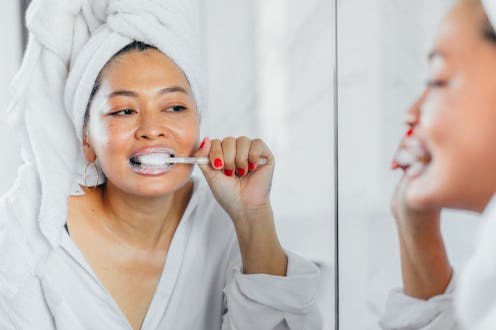Before going to bed, there are two things that I have to do: wash my face and brush my teeth. There's just something extremely satisfying about going to bed with a clean feeling. Well, although I may have a great reputation in keeping my teeth clean before nighttime, I guess I've still been doing it all wrong. Surprisingly there is one thing you shouldn't do after brushing your teeth: rinsing. I know, I'm extremely mind-boggled too. I mean, you're just supposed to leave the gunk and remaining toothpaste in your mouth while you sleep? Well, not exactly, but something like that.
Turns out that rinsing after you brush your teeth removes a lot of the fluoride that protects your teeth from cavities. Dental Hygienist at the Harley Street Dental Studio in London Sally Goss explained in the Daily Mail, "We encourage people to spit out excess toothpaste when they have finished brushing, but not to rinse. This is because toothpaste contains fluoride which strengthens the teeth, so leaving the residue of toothpaste means this fluoride stays around the teeth for longer and so helps make them stronger."
Berkeley Wellness also explained, "Several studies have found that less is more when it comes to rinsing. For instance, in a small study in the International Dental Journal in 2013, rinsing once after brushing resulted in higher fluoride retention than rinsing three times."
So in simpler words, try to avoid rinsing in excess at all costs. If you must, you can rinse at the very minimal. This way your teeth can be protected and you can still get a clean feeling.
This was definitely interesting to know. Although it may be hard to not rinse after brushing your teeth, these other options might help you get the maximum amount of fluoride on your pearly whites.
You Can Slurry
Berkeley Wellness also explained that the process of slurring might help after brushing your teeth. They said, "you can rinse your mouth with a toothpaste 'slurry,' which simply means sipping a tiny amount of water and mixing it with the toothpaste foam in your mouth; briskly swish the slurry around and then spit it out with no further rinsing."
Buy A Fluoride Rinse
ACT Anticavity Fluoride Mouthwash Alcohol Free Mint, $10, Amazon
Instead of rinsing your mouth with regular water, you can use a fluoride rinse. This way you'll still have the ingredient to protect your teeth, but will be able to flush out all the unwanted toothpaste floating around in your mouth.
Rinse Only Once
If you must rinse, try to limit your rinsing to only one time. Use water in minimal amounts and don't do any unnecessary rinsing.
Do A Fluoride Treatment
First Choice Dental explained on their site, "Another way to get more fluoride is through fluoride treatments at your dentist's office. Basically if you lose fluoride faster than you take it in, you are at risk of tooth decay." Make sure to ask your dentist what the best ways of retaining fluoride is for you and your enamel. It all depends on the person's amount of tooth decay and what their situation is.
Images: Studio Firma/Stocksy; Ian Waldie/Getty Images, Eli Kaplan/Getty Images, Sean Gallup/Getty Images; Courtesy of Brands
